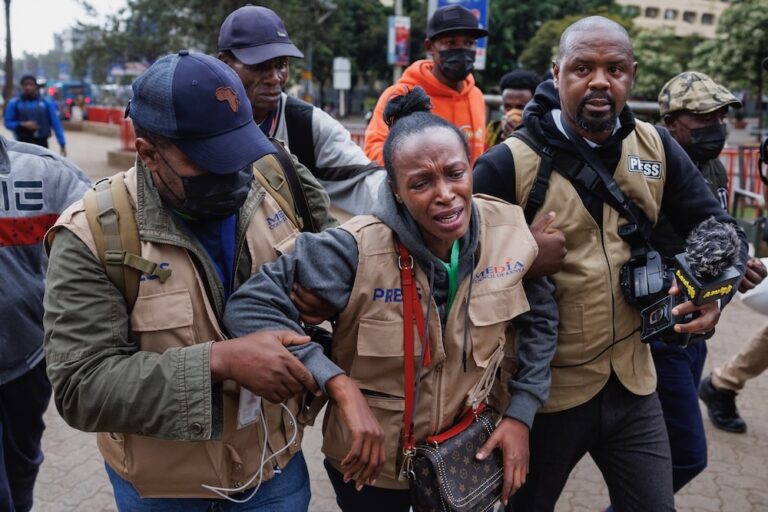(NDIMA/IFEX) – On 22 March 2002, Nicholas Biwott, cabinet minister in the Moi government, was awarded Kes 20 million (approx. US $256,410) for defamation as the High Court slapped a stinging indictment against Kenyan media houses over “unmitigated and defenceless character assassination.” Kalamka Ltd, the publisher of “The People Daily”, was sentenced to pay Biwott […]
(NDIMA/IFEX) – On 22 March 2002, Nicholas Biwott, cabinet minister in the Moi government, was awarded Kes 20 million (approx. US $256,410) for defamation as the High Court slapped a stinging indictment against Kenyan media houses over “unmitigated and defenceless character assassination.”
Kalamka Ltd, the publisher of “The People Daily”, was sentenced to pay Biwott Kes 10 million in compensatory damages and a similar sum in exemplary damages, following the publication of an article implicating Biwott in underhanded dealings involving the award of tenders for the construction of the Turkwell Gorge Hydro-Electric Power project.
High Court Judge Joyce Aluoch barred “the publisher, its agents and servants” from further publishing any defamatory articles on Biwott, minister of trade and industry. Furthermore, the judge instructed the newspaper and its former editor-in-chief, George Mbugguss, to pay the cost of the lawsuit with interest.
“The courts are no longer willing to sit back and watch people’s names, reputation and character being tarnished by falsehoods. We expect the press to investigate the information and/or allegations they get about people or organisations and only print it if they have proof that it is true,” Justice Aluoch declared.
Over the last two years, the judge acknowledged, “The High Court [has] adopted a stern approach to libel by both print and electronic media, authors and publishers of books and magazines. It has to be understood that the purpose is not to stifle them but to encourage mature and responsible journalism.”
Justice Aluoch advised media practitioners to polish their professional ethics by acquainting themselves with the Defamation Act to enable them to effectively and successfully defend libel suits filed against them by aggrieved parties. “A lot of cases [could] be settled out of court or not reach the courts at all if editors of newspapers, authors, publishers or other persons concerned had received the proper advice and acted accordingly,” she said.
In her twenty-four-page judgement, Justice Aluoch held that the offending article, carried by “The People Daily” on 10 March 1999 under the banner headline “The Untold Story of Moi-Nyachae”, defamed Biwott, who was then minister for the East African Cooperation.
Lawyer James Gathaiya, for Kalamka Ltd, said he would challenge the hefty award in the court of appeal. Desterio Oyatsi, Biwott’s lawyer, opposed Gathaiya’s application for a stay of execution, saying that the publisher should have adequate time to make a formal application within the fourteen days granted by law.
The judge found that the story was malicious because of the claims: that Biwott had colluded with a French construction firm, which was willing to bend over backwards to be awarded the massive Turkwell Gorge Hydro-Electric project; that Biwott had breached his oath of office as a minister in the Kenyan government by skipping protocol and signing the contract in a hotel room in Paris, France; that Biwott dishonestly or fraudulently committed the government to the project without waiting for the results of a feasibility study; and that Biwott had committed offences of corruption, both in a private capacity and in his official position in the cabinet.
Justice Aluoch said that the libellous allegations of corruption against Biwott were of a serious nature, particularly because the complainant was elected to office as a member of parliament and cabinet minister.
The justice pointed out that a criminal charge on allegations of corruption is listed as a felony and carries an imprisonment term of no less than five years and no more than ten years. Upon conviction, the offender automatically loses any public office and is barred from being elected or appointed to any public office thereafter. The convict cannot be registered as a voter or participate in any election of a public body in Kenya for the next seven years.
“It is on record that the defendant (‘The People Daily’) did not offer any apology and did not retract the libel even after publishing the plaintiff’s (Biwott’s) right of reply. Besides, the newspaper maintained in their defence that ‘the words were true and fair comment on a matter of public interest’ and denied the meaning Biwott ascribed to the article they published. I find this act of the defendants to have been malicious and only intended to injure Biwott’s feelings. They had the correct version of facts which they even published, yet they still insist in the defence that the words they published were ‘true and fair comment on a matter of public interest’. Does it mean that the defendants did not believe Biwott’s version of facts. I do not know the answer to this question, only the defendants know. Anyway, paragraph 3, 4, 5, 6 and 10 of the defence were struck out, before the suit was heard,” the judge noted.
The minister lodged the suit on 10 November 1999. On 11 July 2000, Biwott applied to have sections of the statement of defence struck out and judgement to be entered in his favour.
On 3 August 2000, Justice Aluoch struck out portions of the newspaper’s defence, entered judgement in Biwott’s favour and awarded him costs. The Court of Appeal upheld Justice Aluoch’s decision in which she held Kalamka Ltd liable for damages.
On 21 February 2002, Biwott made a personal appearance before Justice Aluoch to say that the offending article and its circulation locally and internationally had damaged his reputation and integrity. He said he was the Keiyo South member of parliament (MP), Kenyan minister for trade and industry, minister in the East African Community (EAC) and the Common Market for East and Southern Africa (Comesa) region.
Biwott noted he attended European Union meetings as the current chairman of the Trade Ministers of the African Caribbean and Pacific (ACP) group and the Geneva-based World Trade Organization (WTO). He said he frequently interacted with heads of state in the EAC, Comesa and New Africa Partnership Development Initiative (NEPAT).
The minister conceded that after the offending article was published, he submitted the correct facts and the newspaper carried the story on page fourteen, as opposed to the front page. On 13 May 1999, Biwott’s lawyer, Oyatsi, demanded an unqualified apology and retraction of the allegations. The newspaper did not comply with this request.
Subsequently, on 18 October, Oyatsi wrote to the newspaper once again. When his plea fell on deaf ears, the minister was left with no alternative but to lodge the suit. When he was cross-examined by Gathaiya, lawyer for Kalamka Ltd, Biwott claimed that the gravity of the corruption allegations against him were filed by the local and international media and his reputation was further damaged.
In his submissions on the gravity of the harm inflicted on Biwott, Oyatsi stated that the initial feasibility study on the Turkwell Gorge project was done by the government in 1976 before Biwott joined the cabinet. Four more feasibility studies were undertaken by international consultants, including the World Bank and the European Economic Community (EEC). Based on this, the Kenya Cabinet authorized the commissioning of the project, including financiers and contractors.
Oyatsi maintained that even though Biwott continued to serve as a minister and MP, the stigma on his reputation still remained until he was vindicated by an award of damages. He asked for an award of Kes 12.5 million as compensatory damages and a further Kes 15 million as exemplary damages, for a total of Kes 27.5 million.
Justice Aluoch dismissed the mitigating submissions made by Gathaiya on behalf of Kalamka Ltd, saying its defence had already been struck out during the inter-locutory stage.
The justice stated that recent High Court decisions in which hefty payouts had been awarded in libel cases were not binding on her opinion, “but are of great persuasive value as they show the latest trend in awards of damages for libel.”
Justice Aluoch acknowledged that another High Court judge, Alnashir Visram, “completely revolutionalised” the award of damages in libel cases when he gave Biwott the historic Kes 30 million on 20 December 2000.
On 7 September 2001, High Court Judge Jackson Kasanga Mulwa awarded Nairobi lawyer John Patrick Machira Kes 10 million in damages against the Nation Media Group (see IFEX alert of 10 September 2001). The judge recalled the Kes 2.25 million judgement she had made in favour of Justice John Evans Gacheru, presiding judge of the Court of Appeal, against President Moi’s biographer Andrew Morton and his publisher. Lawyer Fred Ngatia for the appeal judge had asked for Kes 5 million in damages while the defendant’s counsel had conceded an award of Kes 1.5 million.
However, in her judgement delivered on 28 September 2000, Justice Aluoch noted, “The [award of] damages as I see it was left to the court’s discretion, as no obvious principle to be followed in calculating damages was given by either of the two lawyers.”


